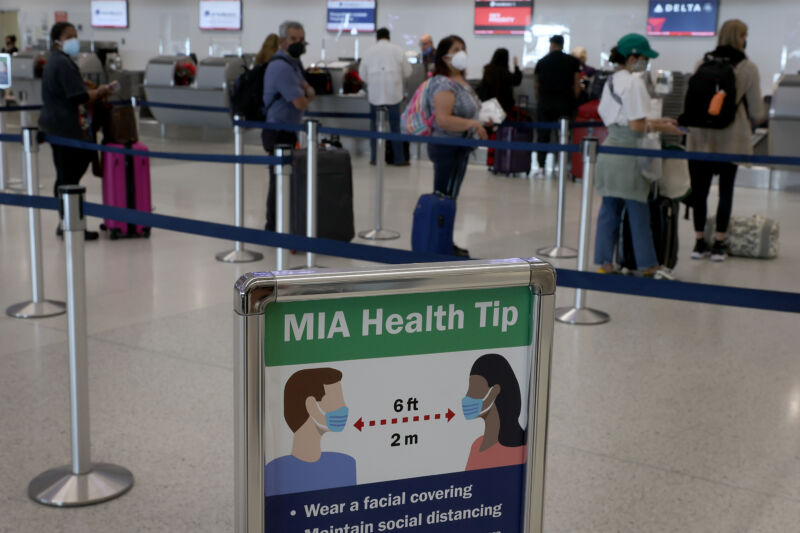
A federal judge in Florida on Monday struck down the Biden administration’s mask mandate for public transit and travel hubs.
The abrupt ruling throws passenger requirements into tumult when Americans are resuming pre-pandemic travel levels and while cases of the omicron subvariant BA.2 have begun ticking upward.
It’s unclear if or when the Department of Justice will appeal the judge’s order and seek a stay to reinstate the mandate until the matter is litigated further. According to the latest reports, administration officials confirmed that the mandate is no longer in place, though the Centers for Disease Control and Prevention still recommends the use of masks on public transit. The administration is said to be reviewing the next steps.
Monday’s ruling came from Federal District Judge Kathryn Kimball Mizelle, who axed the mandate via a case brought in July 2021 by the conservative group Health Freedom Defense Fund and two Florida residents. The residents claimed that the federal mask mandate increased their anxiety and panic attacks.
Mizelle ruled that the CDC—which extended the mandate until May 3—exceeded its authority granted by Congress in enacting the law, and the agency also violated administrative procedures in implementing it. As such, she declared the mandate unlawful and vacated it.
Mizelle’s argument for the ruling is bound to raise legal debate as similar cases have failed many times to take down the federal mandate—including cases that reached the level of the Supreme Court. And Mizelle also has a controversial history. She was appointed to her position in 2020 by former President Donald Trump, despite that the American Bar Association deemed her as “not qualified” to be a district court judge. According to the ABA, nominees to a federal bench should have at least 12 years of experience practicing law before taking the position. But at the time of her nomination, Mizelle had only been a lawyer for eight years, and she hadn’t tried a single case as lead or co-counsel. Still, she was confirmed as a district court judge along party lines.
Cleansing argument
In her 59-page ruling that single-handedly vacated the federal mandate, Mizelle’s argument hinged, in part, on a definition of the word “sanitation” from the 1940s.
In issuing the mask mandate, the CDC drew upon the Public Health Services Act (PHSA) of 1944. Mizelle zoomed in on one particular sentence that reads: “For purposes of carrying out and enforcing such regulations, the [CDC] may provide for such inspection, fumigation, disinfection, sanitation, pest extermination, destruction of animals or articles fount to be so infected or contaminated as to be sources of dangerous infection to human beings, and other measures, as in [the Secretary of Health and Human Services’] judgment may be necessary.” [emphasis added]
The CDC has straightforwardly interpreted “sanitation” and “other measures” to include masking because masks promote “sanitation” as it’s currently defined: “the promotion of hygiene and prevention of disease by maintenance of sanitary conditions.” However, Mizelle sought a definition of “sanitation” from around 1944, when the PHSA was drafted. She referenced the 1946 edition of Funk & Wagnalls New Standard Dictionary, which defined sanitation as “the removal or neutralization of elements injurious to health.” She dubiously argued that the PHSA’s use of “sanitation” was intended to mean “active cleaning.”
The PHSA’s context, she wrote, “indicates that ‘sanitation’ and ‘other measures’ refer to measures that clean something, not ones that keep something clean. Wearing a mask cleans nothing,” she argued. “At most, it traps virus droplets. But it neither ‘sanitizes’ the person wearing the mask nor ‘sanitizes’ the conveyance.”
Despite the obvious counter-argument that a mask cleans exhaled air by trapping and thus removing virus droplets injurious to health, she concludes that the mask mandate “falls outside” the scope of the PHSA.
Articulated reasons
In the second part of her argument, Mizelle focused—at length—on the fact that the CDC skipped a 30-day public comment period before instituting the travel mask mandate. Under the Administrative Procedure Act, the CDC is allowed to skip that 30-day period if it feels it has “good cause,” which applies in “emergency situations” in which a delay “could result in serious harm.”
For its “good cause,” the CDC cited a global pandemic that caused a public health emergency, which has killed nearly a million Americans to date.
While Mizelle seemed to agree with the CDC that the public health emergency amounts to sufficiently good cause to skip the period, she hammered the agency for being too concise in its written justification. Mizelle noted that when the Centers for Medicare and Medicaid Services (CMS) skipped the comment period before mandating COVID-19 vaccines for staff at CMS-funded facilities, the agency wrote a four-page explanation of its “good cause”—complete with 40 footnotes, Mizelle emphasized.
The CDC, on the other hand, justified its abridged timeline with a single sentence, calling it a “commonsense finding” that the pandemic amounted to good cause. But Mizelle wanted receipts, apparently, even though she didn’t necessarily think the agency was wrong.
“The Court accepts the CDC’s policy determination that requiring masks will limit COVID-19 transmission and will thus decrease the serious illnesses and death that COVID-19 occasions,” she wrote. “But the finding by itself is not sufficient to establish good cause.” Elsewhere she lamented that “the CDC failed to articulate that reasoning” and “identify specific reasons.”
“In sum, irrespective of whether the CDC made a good or accurate decision, it needed to explain why it acted as it did,” she wrote.
In all, Mizelle concluded that “it is indisputable that the public has a strong interest in combating the spread of COVID-19… But the mandate exceeded the CDC’s statutory authority, improperly invoked the good cause exception to notice and comment rulemaking, and failed to adequately explain its decisions.” As such, she dubbed the mask mandate unlawful and gave it the ax.








